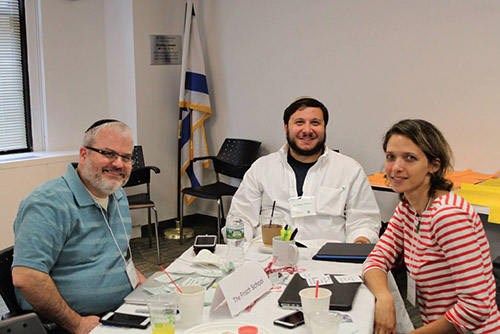
A team of three educators from The Frisch School has won a micro-grant from the Tech for Learning Initiative, a program of The Jewish Education Project supported by the Jim Joseph Foundation, to develop an exciting new multidisciplinary project at Frisch during the 2017-18 academic year. The recipients of the grant are Frisch’s Director of Educational Technology Rabbi Tzvi Pittinsky, Hebrew faculty member Michal Levin, and history department Co-Chair Dr. Ethan Zadoff. Together, they will pilot a project in two classes, one in Hebrew and one in history, in which students will work collaboratively, and with the classroom teacher, to create a methodology of source/textual analysis that can be used across different disciplines, including both limudei kodesh and secular subjects.
The goal of the project, titled “The People of the Book Enter 21st Century Learning,” is to benefit Frisch students “by creating a student-centered learning environment that can be replicated in multiple learning contexts and classrooms at The Frisch School, and using various technology-assisted tools to transform how students collaboratively engage with text,” said Zadoff.
“Technology is one of the primary modes to put learning in the hands of the students,” said Pittinsky. “Students can manipulate text and mind maps themselves. They can research primary and secondary sources. All through the medium of technology. The role of the teacher changes from being the primary source of information to being a facilitator and guide to help students find and process information themselves, a vital skill to helping students become lifelong learners.”
At the beginning of the project, students will work in small, rotating groups to develop the initial scope, sequence and precision of questions to ask while reading different texts— questions to do with authorship, audience, content and meaning. In Zadoff’s history class, those texts will be historical primary and secondary sources. In Levin’s Hebrew class, the texts under study will be various Jewish prayers, in line with the school’s be’ur tefillah (understanding prayer) Hebrew language curriculum. In both subjects, students will examine the text not only from the perspective of the author or intended audience, but of someone else either from the time the text was written or from modern times.
Students will be able to create videos, podcasts, artwork and other interactive media to manifest alternative interpretations of text (including personal reflections on prayer, for Levin’s class). “The pilot classes will use existing technological tools, such as mind mapping applications, in order to record and create the processes of source/textual method development,” said Zadoff. “Following the creation and development of the textual analysis methodology, each class would then apply the method to an already extant annotation tool, for example Kami, in order to use with ease in interpreting a whole variety of sources.” As a capstone project, students will create an interactive website to showcase their process of learning to the greater community.
Levin noted that the project will enrich the experiences of students in all educational tracks at the school. “During the process of this project and in its conclusion we will be able to formulate, together with the students, some type of a methodology? that will be relevant to both the strong and weaker students,” she said.
The nature of the project highlights Frisch’s dynamic approach to learning. “Frisch is continuously committed to embracing the best of progressive education while appreciating traditional approaches, and this is a perfect example of that fusion,” said Frisch Principal Rabbi Eli Ciner.
The Tech for Learning Initiative’s goal is to help schools identify learning challenges and opportunities that can be addressed using technology. “All the work that Frisch has invested over the years, as well as the support of the administration, has made a foundation for a project like this,” said Gary Hartstein, director of The Jewish Education Project’s DigitalJLearning Network (for day schools and yeshivot), about the Frisch team’s model. “What is wonderful about this project is that it is something that can truly make a difference to how learning happens on that campus.”













